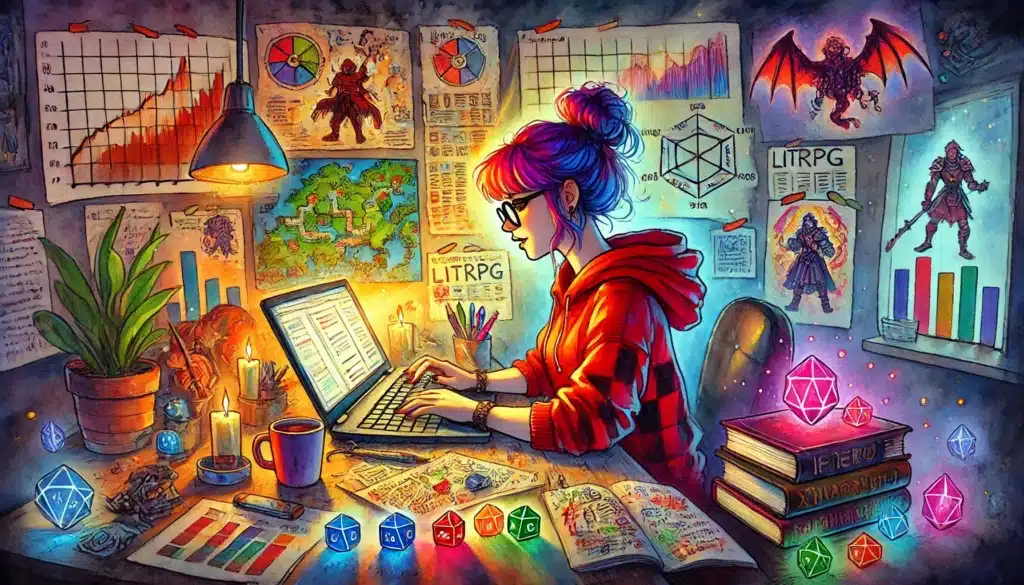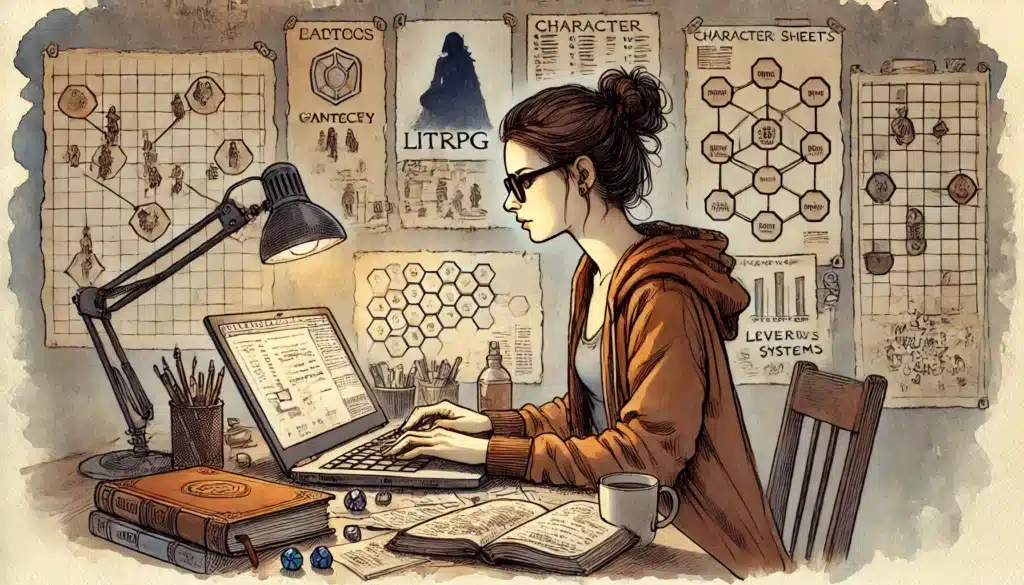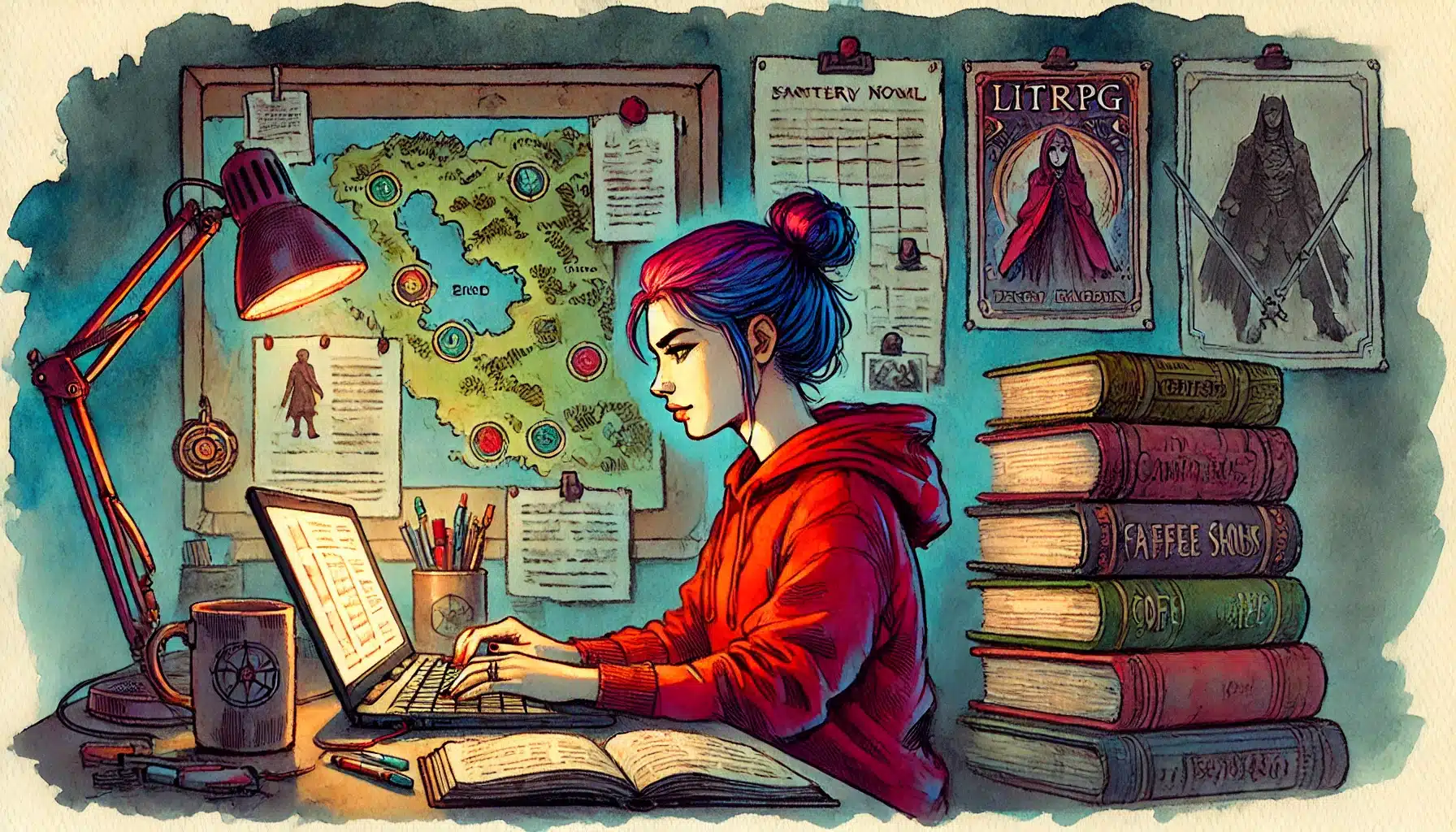LitRPG—short for “literary role-playing game”—occupies a rare crossroads where the pulse of video and tabletop mechanics meets narrative prose. It’s a genre that lures readers with the promise of familiar progression: stat sheets, level-ups, skills, and experience, all wrapped inside a living, breathing world. The joy of LitRPG isn’t merely found in slashing through digital dungeons or watching numbers tick upwards; it’s about seeing growth, agency, and transformation rendered tangible. In these stories, the character’s journey is not only emotional or physical, but also mathematical, marked in numbers and bars that rise with every victory or defeat.
What sets LitRPG apart is its crystal-clear embrace of systems—rules, limitations, and quantifiable progress—but this mechanical transparency can also be a double-edged sword. When wielded with care, stats and system messages serve as the heartbeats of tension, the rhythm of pacing, and the scaffolding for growth. Yet, far too often, they stumble into the story like a rules manual dropped on an unsuspecting reader’s lap: distracting, disconnected, and clunky. Info-dump overload, endless stat sheets, and mechanical asides can pull the rug out from under immersion faster than a surprise dungeon boss.
The seductive challenge for LitRPG writers, then, is balance. How do you make the mechanics—those stats, skills, class choices, and item drops—feel vital rather than vestigial? How do you fuse them so tightly to your world and characters that to remove them would unravel the whole story? The aim isn’t just to report a character’s health or experience points, but to craft a living system that breathes meaning into every gain, every risk, every hard-earned level.
Consider this article your practical DM’s screen: a collection of strategies, examples, and philosophical touchstones for weaving game mechanics and narrative into a seamless whole. Whether you’re new to the genre or hoping to level up your craft, these tools will help you avoid infamous pitfalls and create LitRPG adventures that thrill veteran gamers and fantasy readers alike.
What Makes LitRPG Unique
At its core, LitRPG distinguishes itself from broader fantasy and science fiction by making game systems explicit, visible, and central to the story’s emotional and narrative arcs. Unlike “game-inspired” fiction, which borrows tropes without showing its math, true LitRPG lays bare the wires: numbers, stats, and rules are not hidden—they’re put on center stage. The world itself operates on logical systems that the characters must learn, master, and sometimes even hack to survive.
These RPG mechanics are not mere flavor text or window dressing. They are integral to the plot, shaping everything from the stakes of a boss fight to the intricacies of political intrigue. When a party’s rogue loses hit points, it’s not only a narrative setback but an existential threat, quantified in real time. When a protagonist unlocks a new skill tree, it’s a tangible evolution of both ability and identity. In LitRPG, the very rules of the world become the obstacles, teachers, and adversaries—unlike in most other speculative fiction.
Try my AI Tabletop RPG generators...and an extensive library of content!
But not every tally of EXP or list of equipment will make hearts race. The genre’s real power emerges when system transparency is used to heighten suspense, render progress concrete, and allow character choices to ripple through every facet of the adventure. The best LitRPGs don’t just list features—they animate them.
Core Features of LitRPG:
- Stat sheets (attributes clearly displayed)
- Level-up events
- Skill trees and unlocked abilities
- Item drops and equipment upgrades
- System messages and notifications
- Experience point (EXP) accumulation and thresholds
- Class or job roles with distinct powers
- Quests and mission objectives, often tracked or logged
- Health, mana, stamina, or other resource bars
- Party structure and character synergies
- Damage numbers (sometimes described visually or through pop-ups)
- Buffs, debuffs, status effects
- Achievements or rare titles earned
- Player- or NPC-driven economy (loot, auctions, trading)
- Death penalties, respawn mechanics, or permadeath risks
Incorporating these elements, however, comes with a caveat. When overused or prioritized above story fundamentals, they risk becoming a mechanical haze that blurs character and stakes. Stats should be tools—servants to the narrative, not its overlords. Every mechanic should earn its keep by deepening immersion, tension, and investment. Remember: the heart of LitRPG is the human (or inhuman) pulse behind every number.

Designing a System That Feels Natural
Careful system design lies at the foundation of every unforgettable LitRPG adventure. It’s the difference between a world that feels realistic—internally tight, with stakes and consequences that ring true—and one that collapses under the scrutiny of its own rules. Your readers are smart; they can smell a broken economy, an overpowered item, or a progression curve that’s simply “off.”
Start with limitations. Every system, no matter how fantastic, needs boundaries. How much mana can a mage sling before exhaustion? Is there a cooldown on resurrection skills? Are legendary weapons truly one-of-a-kind, or does everyone in the inn have a sword “Forged by the Ancients”? Boundaries generate tension and make rewards feel earned. Without them, number inflation sets in and satisfaction drains away.
⚔️ Fantasy RPG Random Tables Books
Make life as a Gamemaster easier…
If you play Dungeons & Dragons, Pathfinder, or other fantasy RPGs, this
RPG random tables series
is packed with encounters, NPCs, treasure, and more. Available in eBook or print—either way, you’ll have a wealth of adventure ideas at your fingertips.
Next, ensure that progression is logical and tied to the world’s lore. Why do skills unlock the way they do? Does a character need to study forbidden tomes, train with a master, or channel the gods? The more your upgrade trees and abilities make sense within the world’s history and culture, the less “gamey” and more immersive they become. Let learning the system mirror how we learn any skill—hard-won, incremental, sometimes risky.
Above all, tie every mechanic—every stat, ability, and penalty—back into the narrative. If a rogue’s stamina system means he can only dodge twice before windedness sets in, use that in a desperate chase scene. If poison resistances are gained through questing, let that arc fuel political or interpersonal intrigue.
| Mechanic Type | Narrative Role | Example Application |
|---|---|---|
| Mana Pool | Resource Management | Mage out of mana at crucial moment—must improvise |
| Skill Points | Training Obstacle | Character must choose between skills, shaping arc |
| Cooldown Timers | Conflict Limiter | Ultimate attack unavailable during boss rush |
| Item Durability | Tension/Drama Driver | Sword breaks mid-fight; scramble for replacement |
| Hidden Achievements | Character Revelation | Unexpected title grants plot-critical ability |
| Party Synergy | Relationship Builder | Coordinated skills unlock new tactics in finale |
Systems should be robust enough to challenge, but intuitive enough for readers to grasp as the stakes rise. Avoid the temptation to re-explain rules at every turn—you’re not teaching a board game. Trust your audience to learn as the protagonist does, picking up on strengths, weaknesses, and mechanics as they unfold organically.
As a rule of thumb, if a mechanic feels clunky or requires footnotes, it likely needs streamlining. Let your system be the silent engine—felt, but not always seen—whirring beneath every chapter, propelling characters toward triumph or tragedy.
Integrating Stats Without Losing Flow
Mention a pop-up window, and every LitRPG reader’s mind snaps to attention. The danger, however, is that too many stats or system messages can stutter narrative momentum, yanking readers out of immersion just as tension peaks. The skillful writer lets stats enhance, not cannibalize, the story’s rhythm.
Stats should be revealed at meaningful junctures, not littered across the page like confetti. Consider frequency: a stat update at the climax of a desperate boss battle will land with far more impact than yet another routine progress report after a training montage. Use formatting savvy—system messages should stand out (italics, brackets, text boxes), but not dominate the page. Let the protagonist’s reactions guide the reader’s understanding. If a new ability unlocks, show the visceral rush or sudden fear, not just the numbers.
Integrate “game” elements into the character’s internal monologue. A sudden “You have advanced to Level 10!” isn’t just a system beep—it’s an emotional beat. What does it mean for the character’s confidence, their fears, their relationships? If a health bar plummets, does it trigger panic, resolve, or even a flashback to a previous defeat?
Techniques for Seamless Stat Integration:
- Use pop-up windows as extensions of internal dialogue
- Limit stat updates to key events (boss fights, major quests, or dramatic turning points)
- Tie stat reveals to emotional or psychological shifts (“He barely noticed his stamina draining—until fear sharpened his focus”)
- Reveal stats via dialogue (“You’re only level 4? I thought you’d be stronger…”)
- Let changes in numbers echo in physical description (strength boost resulting in shattering handcuffs)
- Use partial stat sheets (just what’s relevant now—not everything)
- Write system messages in the protagonist’s “voice” to build character
- Convey progression implicitly (show increased skill rather than just stating it)
- Color-code, offset, or italicize system text, distinguishing it visually from narration
- Drop hints of system mechanics through worldbuilding (NPCs reacting to visible levels/titles)
- Use unreliable stat reporting to build suspense (mysterious glitch, missing information)
- Integrate system feedback with rising stakes, not routine exposition
Saving stats for crucial moments creates anticipation. Readers come to recognize the rhythm—when the numbers appear, something matters. A well-placed update can raise the stakes, signal transformation, or shatter expectations. Used sparingly but strategically, stats pack a punch.
In the end, less is more. The true thrill lies not in seeing every number tick up but in sensing those numbers echo through character choices, victories, defeats, and risks taken. The stats remind us: every battle, every quest, every gambit—win or lose—counts.
Making Level-Ups Matter
If level-ups are handed out like participation trophies, they lose their narrative weight. Treating progression as just another box to check creates a numbing sameness. Instead, anchor level-ups to the marrow of your story: to moments of genuine risk, sacrifice, or revelation.
The best level-ups are hard-won. Defeating a boss is more than swinging a sword—it’s overcoming trauma, mastering fear, or cementing bonds with allies. A newly unlocked skill should reflect more than mechanical improvement; it marks a milestone in the protagonist’s journey. Did a character face a threat to protect a friend? Did they solve a riddle lost to scholars for generations? These are the seeds of resonance.
⚔️ Fantasy RPG Random Tables Books
Make life as a Gamemaster easier…
If you play Dungeons & Dragons, Pathfinder, or other fantasy RPGs, this
RPG random tables series
is packed with encounters, NPCs, treasure, and more. Available in eBook or print—either way, you’ll have a wealth of adventure ideas at your fingertips.
Tie upgrades to emotional and narrative progress. Let a level-up signal the end of a mentor’s training, the forging of an unbreakable oath, or the final acceptance of a secret, shameful truth. Progression should push the plot forward, opening new doors, ratcheting up stakes, and forcing choices that shape destiny.
Narrative Consequences & Triggers for Level-Ups:
- Defeating a story-critical boss or antagonist
- Completing a major personal quest or vow
- Discovering forgotten knowledge or ancient magic
- Surviving near-death or catastrophic setbacks
- Resolving a key personal or interpersonal conflict
- Acquiring a legendary item tied to protagonist’s fate
- Overcoming a long-standing phobia or doubt
- Making a selfless (or selfish) choice with lasting impact
- Achieving mastery after long training/mistakes
- Uniting with or saving a party member against impossible odds
- Forging alliances that shift the power dynamic
- Decoding cryptic system or world lore
- Facing and learning from betrayal
- Accepting the loss of a guide or mentor
- Expanding awareness of the world’s true mechanics
When every advancement means something, readers lean forward. They anticipate the next breakthrough not just as a reward, but as the next dramatic twist or emotional reckoning.
This is what hooks the LitRPG audience: not an endless treadmill of numbers, but the prospect of real growth—progression earned in fire, loss, triumph, and change. When every level-up echoes through the character’s heart and the plot’s trajectory, your story will pulse with authentic stakes.
Using Mechanics for Character Development
Character sheets in LitRPGs do more than track numbers—they map a protagonist’s dreams, limitations, ambitions, and even internal contradictions. A high-agility, low-strength build isn’t just stats; it’s a statement of personality and playstyle. The system choices your characters make—class, abilities, risk versus caution—unveil the layers of who they are and hint at who they might become.
Consider how starting stats reflect past experiences or beliefs. An orphaned bard might invest in charisma to mask vulnerability; a vengeful knight favors offense over defense, risking all for power. Over time, changing builds, evolving skill trees, and newly earned perks become markers of lived experience, not just upgrades. Shifts in role—from lone wolf to team player, from greedy loot-hound to selfless protector—can manifest both narratively and numerically.
Mechanics can dramatize internal change. If a character invests a hard-earned stat point into empathy instead of brute force, it signals a reordering of values. If a party’s “tank” starts diversifying skills to protect allies rather than maximize damage, it reflects relational growth. Every system interaction is an opportunity for character revelation.
| Character Type | System Choices | What It Says About Them | How It Evolves |
|---|---|---|---|
| Glass Cannon | Max damage, low defense | Reckless, ambitious, overconfident | Learns caution after losses |
| Passive Build | Focus on support/buffs | Self-effacing, altruistic, overlooked | Embraces leadership, assertiveness |
| Jack-of-All-Trades | Balanced stats | Adaptable, restless, indecisive | Specializes to meet new challenges |
| Lone Wolf | Solo skills, stealth | Distrustful, independent | Learns value of teamwork |
| Tank/Protector | High defense, aggro | Protective, loyal, self-sacrificing | Faces burnout, accepts help |
When your game mechanics are woven into emotional arcs, readers don’t just follow upgrades—they witness a character’s soul in flux. The math becomes metaphor, and every number tells a story.
So, build stats and systems that reflect not just power, but transformation. Let each new skill express a hard-won facet of your hero—or antihero. When the rules of the game mirror the beats of the heart, LitRPG transcends formula and becomes unforgettable.
Worldbuilding Through Game Logic
A true LitRPG universe moves to the pulse of its own systems. The mechanics shape not just dungeons and duels, but the very social fabric: who holds power, who suffers, what dreams are possible, and what destinies denied. To write a living, breathing world, consider how society, economy, and day-to-day culture respond to the RPG rules etched into reality.
How do NPCs regard a protagonist with rare skills or a high-level title? Are there festivals around stat milestones? Are cities segregated by class or skill ceiling? Does the marketplace trade in loot drops and enchanted gear? When every citizen knows their “rating” or can see a stat sheet, status and aspiration take on literal, visible meaning.
Let game logic ripple through every institution. Guilds may rise and fall based on quest performance. Laws might punish misuse of forbidden magic, tracked by an all-seeing system. Even relationships can be mediated by mechanics—loves sealed with magical contracts, betrayals penalized by curses or system-imposed debuffs. The world itself becomes a living player in the drama.
Try my AI Tabletop RPG generators...and an extensive library of content!
Mechanics-Based Worldbuilding Examples:
- Guild hierarchies determined by rank or quest points
- Quest-based economies (currency or resources earned via system quests)
- Class- or skill-based city districts (“Only healers allowed in the Sanctuary Zone”)
- Achievements or titles conferring social status or privileges
- Item crafting prestige and trade guild rivalries
- Stat-or-title based legal rights (e.g., high-Charisma PCs exempt from taxes)
- System-enforced contracts, pacts, or oaths (magically binding agreements)
- Arena tournaments with public level displays
- NPC shops that refuse service based on player stats, titles, or reputation
- Level gates blocking access to certain regions or dungeons
- “Public boards” displaying player progress or party accomplishments
- Permadeath towns or risk zones for high-level challengers
- System-administered bounties or penalties (crime and punishment)
- Festivals or rituals marking quest completions or power milestones
When your world moves in sync with its own logic, readers feel the grip of immersion. Actions have consequence. Status has weight. The game isn’t just played—it’s lived.
Consistency is crucial—never let a system serve plot convenience over world coherence. The more fully you entwine mechanics with the warp and weft of society, the more believable—and addictive—your universe becomes.

Avoiding Common Pitfalls
Even the most ambitious LitRPG can stumble into traps that turn gameplay gold into narrative lead. All too often, new writers fall prey to info dump syndrome, cramming pages with stat sheets, skill lists, or encyclopedic system explanations. There’s a difference between “showing your work” and giving your readers homework.
Stat obsession is another common bugbear. When you spend more time reporting attribute bonuses than advancing the plot, the story starts to lag. Likewise, repetitive mechanics—every fight follows the same formula, every quest nets the same upgrade—erode tension and make progression feel hollow. And beware the “mystery mechanic” trap: suddenly introducing new rules late in the game with no foreshadowing can confuse and frustrate.
Perhaps most dangerous is unexplained or unearned power scaling. Characters who jump ten levels overnight, unlock skills without cost, or trivialize obstacles by breaking the system, will lose their audience’s investment. Mechanics are only meaningful when they carry weight, risk, and consequence.
LitRPG Red Flags to Avoid:
- Presenting full stat lists or equipment sheets every chapter
- Level-ups that come after every minor encounter
- Ignoring negative side effects of abilities or power-ups
- Introducing system mechanics late without prior hints
- Bypassing or hand-waving established system limitations
- Granting deus ex machina skills at convenient moments
- Reusing identical quest structures repeatedly
- Failing to describe how mechanics impact the world or NPCs
- Making numbers more important than character choices
- Glossing over or skipping defeats, injuries, or setbacks
- Unclear rules for how progression or abilities work
- Ignoring economic impact of loot and item drops
- Resurrecting the dead without narrative cost
The surest safeguard? Careful editing and reader feedback. Beta testers—especially those well-versed in RPG systems—are your secret weapon. If a scene feels slow, confusing, or mechanically inconsistent, revise until the gears mesh perfectly.
Ultimately, the soul of LitRPG is balance: mechanics and story, tension and release, innovation and familiarity. Keep the focus on your characters, the world they inhabit, and the stakes that give every stat meaning.

Final Tips for Writing LitRPG That Works
Great LitRPG isn’t just a catalog of cool powers or a parade of numbers—it’s a high-wire act where mechanics amplify drama, emotion, and character transformation. The best stories use systems as shorthand for growth and tension, not as a replacement for narrative substance. Fight the urge to over-explain. Clarity, not density, is your guiding star.
Consistency is your ally. Once you establish rules—about progression, resources, or world logic—respect them. Readers delight not only in victory, but in constraint and cleverness. A single broken rule that serves authorial convenience can shatter trust in your story’s world.
Emotional investment is the treasure at the heart of every LitRPG. Characters are more than stat blocks; they’re living, struggling, evolving beings whose choices—both mechanical and moral—matter. Use systems to mirror their inner turmoil and triumphs. When unlocking a skill feels like unlocking courage, when a title gained marks a new chapter of selfhood, you’re truly writing LitRPG.
Finally, read widely within the genre, dissect your favorite (and least favorite) examples, and keep a gamemaster’s mindset: challenge, surprise, and reward your audience. Iteration is key—systems that sing on the first draft are rare. Test, tweak, and listen to feedback. Trust your vision, but never let mechanics obscure your characters’ hearts.
Stats aren’t just numbers. They’re the echoes of your hero’s journey, the drumbeat of danger, the arithmetic of hope. Make them count—and your story will linger with your readers, game-like, long after the final quest is won.
⚔️ Fantasy RPG Random Tables Books
Make life as a Gamemaster easier…
If you play Dungeons & Dragons, Pathfinder, or other fantasy RPGs, this
RPG random tables series
is packed with encounters, NPCs, treasure, and more. Available in eBook or print—either way, you’ll have a wealth of adventure ideas at your fingertips.










